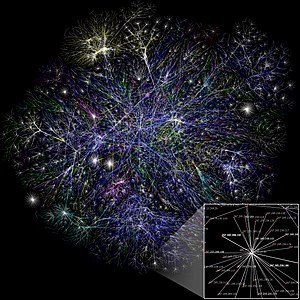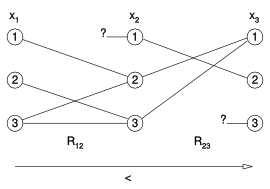 In computer programming, a variable is a storage location and an associated symbolic name (an identifier) which contains some known or unknown quantity or information, a value. The variable name is the usual way to reference the stored value; this separation of name and content allows the name to be used independently of the exact information it represents. The identifier in computer source code can be bound to a value during run time, and the value of the variable may thus change during the course of program execution. Variables in programming may not directly correspond to the concept of variables in mathematics. The value of a computing variable is not necessarily part of an equation or formula as in mathematics. In computing, a variable may be employed in a repetitive process: assigned a value in one place, then used elsewhere, then reassigned a new value and used again in the same way (see iteration). Variables in computer programming are frequently given long names to make them relatively descriptive of their use, whereas variables in mathematics often have terse, one- or two-character names for brevity in transcription and manipulation.[/caption]
In computer programming, a variable is a storage location and an associated symbolic name (an identifier) which contains some known or unknown quantity or information, a value. The variable name is the usual way to reference the stored value; this separation of name and content allows the name to be used independently of the exact information it represents. The identifier in computer source code can be bound to a value during run time, and the value of the variable may thus change during the course of program execution. Variables in programming may not directly correspond to the concept of variables in mathematics. The value of a computing variable is not necessarily part of an equation or formula as in mathematics. In computing, a variable may be employed in a repetitive process: assigned a value in one place, then used elsewhere, then reassigned a new value and used again in the same way (see iteration). Variables in computer programming are frequently given long names to make them relatively descriptive of their use, whereas variables in mathematics often have terse, one- or two-character names for brevity in transcription and manipulation.[/caption]A variable storage location may be referred by several different identifiers, a situation known as aliasing. Assigning a value to the variable using one of the identifiers will change the value that can be accessed through the other identifiers.
Compilers have to replace variables' symbolic names with the actual locations of the data. While a variable's name, type, and location often remain fixed, the data stored in the location may be changed during program execution.
[caption id="" align="alignright" width="240"]
 Tidal computer (Photo credit: awduthie)[/caption]
Tidal computer (Photo credit: awduthie)[/caption]Actions on a variable
In imperative programming languages, values can generally be accessed or changed at any time. However, in pure functional and logic languages, variables are bound to expressions and keep a single value during their entire lifetime due to the requirements of referential transparency. In imperative languages, the same behavior is exhibited by constants, which are typically contrasted with normal variables.
Depending on the type system of a programming language, variables may only be able to store a specified datatype (e.g. integer or string). Alternatively, a datatype may be associated only with the current value, allowing a single variable to store anything supported by the programming language.
[caption id="" align="alignright" width="270"]
 An instance that is directionally arc consistent according to the order x1 x2 x3 but not arc consistent (no constraint is present between x1 and x3; corresponding edges omitted). Every value of a lower-index variable corresponds to values of higher index variables. Question marks indicate points where the converse does not hold. (Photo credit: Wikipedia)[/caption]
An instance that is directionally arc consistent according to the order x1 x2 x3 but not arc consistent (no constraint is present between x1 and x3; corresponding edges omitted). Every value of a lower-index variable corresponds to values of higher index variables. Question marks indicate points where the converse does not hold. (Photo credit: Wikipedia)[/caption]Identifiers referencing a variable
An identifier referencing a variable can be used to access the variable in order to read out the value, or alter the value, or edit the attributes of the variable, such as access permission, locks,semaphores, etc.
For instance, a variable might be referenced by the identifier "
total_count" and the variable can contain the number 1956. If the same variable is referenced by the identifier "x" as well, and if using this identifier "x", the value of the variable is altered to 2009, then reading the value using the identifier "total_count" will yield a result of 2009 and not 1956.If a variable is only referenced by a single identifier that can simply be called the name of the variable. Otherwise, we can speak of one of the names of the variable. For instance, in the previous example, the "
total_count" is a name of the variable in question, and "x" is another name of the same variable.Scope and extent
The scope of a variable describes where in a program's text the variable may be used, while the extent (or lifetime) describes when in a program's execution a variable has a (meaningful) value. The scope of a variable is actually a property of the name of the variable, and the extent is a property of the variable itself.
A variable name's scope affects its extent.
Scope is a lexical aspect of a variable. Most languages define a specific scope for each variable (as well as any other named entity), which may differ within a given program. The scope of a variable is the portion of the program code for which the variable's name has meaning and for which the variable is said to be "visible". Entrance into that scope typically begins a variable's lifetime and exit from that scope typically ends its lifetime. For instance, a variable with "lexical scope" is meaningful only within a certain block of statements or subroutine. Variables only accessible within a certain functions are termed "local variables". A "global variable", or one with indefinite scope, may be referred to anywhere in the program.
Extent, on the other hand, is a runtime (dynamic) aspect of a variable. Each binding of a variable to a value can have its own extent at runtime. The extent of the binding is the portion of the program's execution time during which the variable continues to refer to the same value or memory location. A running program may enter and leave a given extent many times, as in the case of aclosure.
[caption id="" align="alignright" width="300"]
 C language example. Illustrates difference between variables and arrays. (Photo credit: Wikipedia)[/caption]
C language example. Illustrates difference between variables and arrays. (Photo credit: Wikipedia)[/caption]Unless the programming language features garbage collection, a variable whose extent permanently outlasts its scope can result in a memory leak, whereby the memory allocated for the variable can never be freed since the variable which would be used to reference it for deallocation purposes is no longer accessible. However, it can be permissible for a variable binding to extend beyond its scope, as occurs in Lisp closures and C static local variables; when execution passes back into the variable's scope, the variable may once again be used. A variable whose scope begins before its extent does is said to be uninitialized and often has an undefined, arbitrary value if accessed (see wild pointer), since it has yet to be explicitly given a particular value. A variable whose extent ends before its scope does may become a dangling pointer and deemed uninitialized once more since its value has been destroyed. Variables described by the previous two cases may be said to be out of extent or unbound. In many languages, it is an error to try to use the value of a variable when it is out of extent. In other languages, doing so may yield unpredictable results. Such a variable may, however, be assigned a new value, which gives it a new extent.
For space efficiency, a memory space needed for a variable may be allocated only when the variable is first used and freed when it is no longer needed. A variable is only needed when it is in scope, but beginning each variable's lifetime when it enters scope may give space to unused variables. To avoid wasting such space, compilers often warn programmers if a variable is declared but not used.
It is considered good programming practice to make the scope of variables as narrow as feasible so that different parts of a program do not accidentally interact with each other by modifying each other's variables. Doing so also prevents action at a distance. Common techniques for doing so are to have different sections of a program use different name spaces, or to make individual variables "private" through either dynamic variable scoping or lexical variable scoping.
Many programming languages employ a reserved value (often named null or nil) to indicate an invalid or uninitialized variable.
Source
Creative Commons Attribution-ShareAlike License

No comments:
Post a Comment